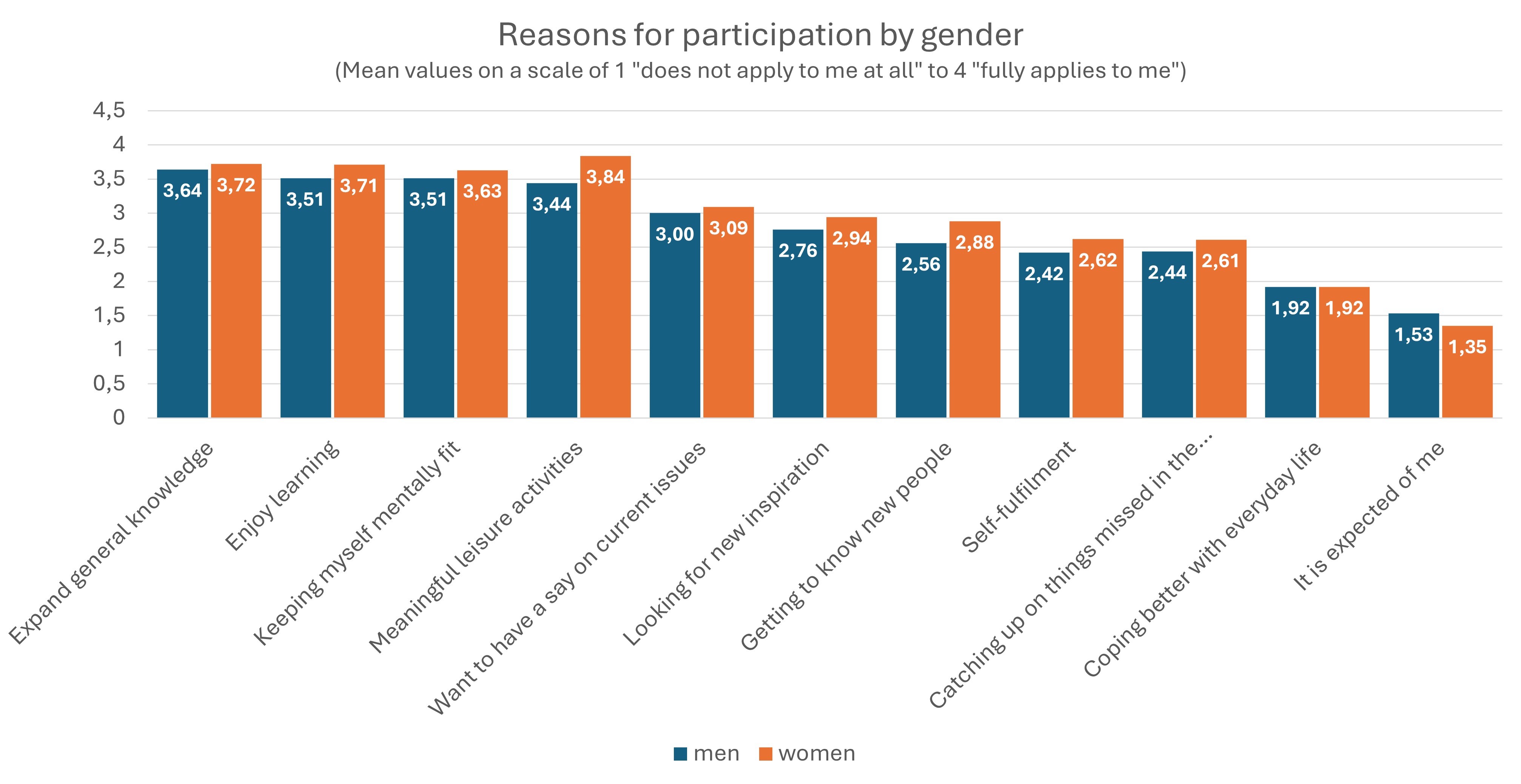Swiss 65+ Education Report: Results Call for Lifelong Education for an Active Generation
The Swiss Association of Seniors Universities (U3) and the Association of Swiss Adult Education Centers (VSV) published the Swiss 65+ Education Report at the end of 2023. This first report of its kind notes that despite the great importance of lifelong learning, little is invested in public education for people aged 65 and over at both cantonal and federal level. One of the reasons for this is that there has been no quality monitoring to date. The report aims to change this. It describes the current state of the 65+ public education landscape and identifies necessities and resource requirements. Education providers will find, for example, indications of desired topics and forms of learning, and they can be pleased with the largely positive evaluations. Here we highlight four aspects that go beyond the evaluation of offers – in a nutshell (but yes, that’s probably in the eye of the reader 😉).
The Sample
- Persons surveyed: 5,671
- 4,131 from 9 seniors universities
- 1,540 from 9 adult education centers
- Average age: 72.7 years
- Age range: 60 – 98 years
- Questionnaires (mainly online)
- Focus topic: Digitalization & and use of technology

Which Reasons do You Have for Participating in Educational Programs?
I don’t think much of standing still. I am convinced that lifelong learning improves the quality of life. Even in the post-professional phase of my life, I want to continue to develop and remain open to topics that move or should move our society.
Erica Benz-Steffen, member of the seniors university Zurich
There are various answers to this question, and various reasons have been suggested in the study (see graph below). The most popular reason was that respondents wanted to expand their general knowledge. In the overview, intrinsic motives, i.e. motives from within a person, tend to be decisive. Learning is predominantly not perceived as a duty, but as a meaningful leisure activity to expand knowledge, to strengthen personal skills and to try out new things. It is noteworthy that the subject area of “history, cultural history, society and politics” is considered to be the most important. These results are also relevant in terms of education policy, as the respondents clearly prioritize openness to new developments, meaningful activities, mental fitness and social engagement over offers in the health sector.

How do You Judge “Education for the Elderly”?
The findings on subjective questions relating to the topic of “education in old age” are also remarkable. Above all, respondents see opportunities in getting older, and the results paint a very positive portrait of old age:
- “For me, getting older means that I am still able to learn new things”
was indicated by 98% of respondents. - “Even in old age, I can motivate myself for education”
was indicated by 98% of respondents. - “For me, getting older means that I continue to make lots of plans”
was indicated by 91% of respondents.
Perhaps we could learn from this specific target group about the factors that contribute to the development, maintenance and strengthening of a positive image of ageing over the years?
How do You Prefer to Learn? Online vs. presence
With regard to on-site or online training, the majority of respondents stated that they would prefer to learn on site. However, almost half of those surveyed, 45% in total, preferred online participation. The advantage of online offerings, i.e., the fact that learning can take place anywhere and at any time, was emphasized. These results encourage us to continue researching and developing online forms of learning, with the aim
- of expanding the range of courses offered,
- to meet the needs of different life situations,
- and to respond to the demand for customized educational offerings (which has almost quadrupled since 2012).

The “Matthew Effect” as a Challenge
However, the report also shows that it is mainly people with a strong educational background who take advantage of the offers, which can be seen, for example, in the biographical affinities of the respondents: 29% were employed in a school or in adult education. People who are well educated also use educational offers more frequently and benefit from them in old age, while people with a lower level of education participate significantly less often. In age research, this is referred to as the “Matthew Effect”: “For to everyone who has, more shall be given”. This poses a challenge, as the advantage of more education, and subsequently even more education, has the greatest impact in old age. In order to promote equal opportunities and ensure that as many people as possible benefit, tailor-made educational offers should be developed that cater to the diversity of participants.
Conclusion
The results from the Swiss 65+ Education Report of 2023 show the important role that educational opportunities play in the lives of those surveyed: as a self-chosen, meaningful leisure activity to expand knowledge, strengthen themselves and try out new things. The demand for high-quality and diverse educational opportunities is increasing, while at the same time there is a lack of public investment in the 65+ education sector. It becomes very clear that the respondents demand a socially active role and thus active promotion of education for the entire lifespan. In educational research, we are challenged to translate the results from theory into practice on site and online faster than before.
You can download the entire education report (only in German) here:
References
Huber, N. & Bauer, M. (1. März 2022). Ich halte nicht viel von Stillstand. UZH News. https://www.news.uzh.ch/de/articles/2022/seniorenuniversitaet.html
Seifert, A., Martin, M., Lanarés, J., Schärer, H.‑R., & Knüsel, P. (2023). Schweizer Bildungsbericht 65+ 2023. https://uni-3.ch/images/pdf/U3-Befragung_Bericht_2023/U3_VHS_Bericht_23_Deutsch.pdf
The images used are from www.freepik.com
